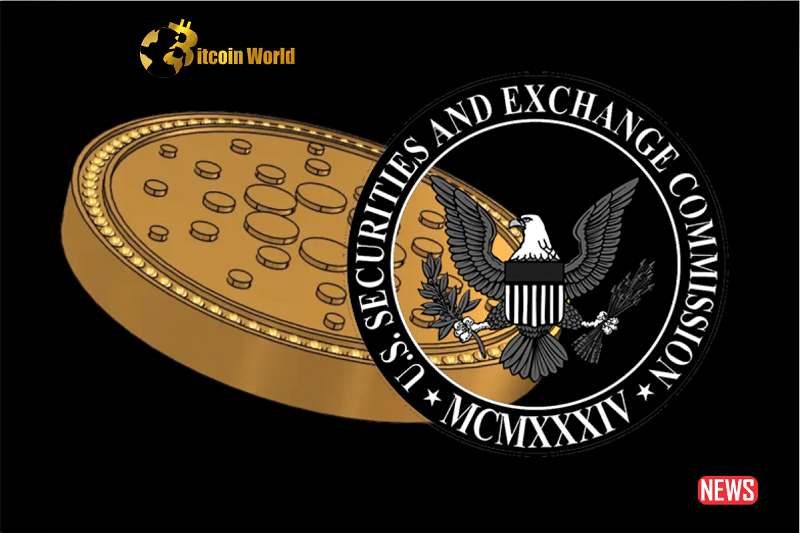The crypto world is buzzing, and at the heart of the latest debate is Cardano’s native token, ADA. Imagine a high-stakes legal drama where the future of cryptocurrency regulation hangs in the balance. That’s essentially what’s unfolding as legal experts and crypto enthusiasts grapple with the U.S. Securities and Exchange Commission’s (SEC) classification of ADA as a security. A recent Twitter exchange involving the insightful Bill Morgan has thrown a fresh spotlight on this critical issue, leaving many to wonder: is the SEC’s reasoning solid, or is there more to this story?
Why is the SEC Calling ADA a Security?
Let’s break down the SEC’s argument. According to their reports, the classification hinges on information shared by Cardano’s key players – Cardano itself, Input Output (IOHK), and Emurgo – particularly around the time of ADA’s initial coin offering (ICO). The SEC’s core contention is that individuals who purchased ADA viewed it as an investment, expecting to profit from the efforts of these entities. Think of it like buying shares in a company, hoping their hard work will boost the stock price.
Here’s a closer look at the SEC’s reasoning:
- Focus on Initial Sales: The SEC is scrutinizing the period from 2016 to 2021, suggesting that early buyers anticipated gains from the ongoing development of the Cardano blockchain.
- Reliance on Public Statements: Blog posts and public communications from Cardano, IOHK, and Emurgo are being used as evidence to support the SEC’s claim.
- Expectation of Profit: The lawsuit argues that buyers invested in ADA with the expectation that the efforts of these entities would increase the token’s value.
Bill Morgan’s Counter-Argument: A Different Perspective
Enter Bill Morgan, a well-respected voice in the digital asset space. He’s publicly questioned the SEC’s logic, drawing an interesting parallel. Think about any industry – companies constantly strive to improve their products and market them effectively. Isn’t that just good business? Morgan argues that the SEC seems to be applying a different standard to cryptocurrencies like Cardano, penalizing them for the very activities that drive innovation and adoption.
He further speculates that Charles Hoskinson, Cardano’s founder, likely believes the courts will not consider Cardano’s actions as creating investment contracts. This suggests a fundamental disagreement on whether the sale and promotion of ADA constitute the sale of securities.
The Smartphone Analogy: Where Do We Draw the Line?
The debate took an intriguing turn when Mark Fagel, a former SEC law enforcement attorney, raised a thought-provoking counterpoint. He questioned the notion of secondary markets for everyday products like smartphones being considered investment opportunities. Imagine buying and selling smartphones hoping for a profit based on the manufacturer’s next big innovation – it sounds a bit far-fetched, right?
While Morgan acknowledged the distinction between traditional products and cryptocurrencies, he remains unconvinced that this difference alone justifies classifying ADA as a security. This highlights the core challenge: where do we draw the line between a digital asset and a security?
What Does This Mean for the Future of Cardano and Crypto?
The outcome of this legal tussle has significant implications that extend far beyond Cardano. It touches upon the very heart of cryptocurrency regulation in the United States and potentially globally.
Potential Impacts:
- Regulatory Clarity (or Lack Thereof): This case could set a precedent for how other cryptocurrencies are classified, providing much-needed clarity or further muddying the waters.
- Impact on Innovation: If promoting and developing a cryptocurrency is seen as offering a security, it could stifle innovation and discourage development.
- Investor Rights and Responsibilities: The classification of ADA as a security would bring it under stricter regulatory oversight, impacting investor protection and reporting requirements.
- Market Dynamics: The price and availability of ADA on exchanges could be significantly affected by the outcome of this case.

The Bottom Line: A Landscape in Flux
The ongoing debate surrounding the SEC’s classification of Cardano’s ADA is more than just a legal skirmish. It’s a reflection of the broader struggle to define and regulate digital assets in a rapidly evolving technological landscape. The contrasting views of experts like Bill Morgan and Mark Fagel underscore the complexities involved. As the legal process unfolds, the cryptocurrency industry watches with bated breath, knowing that the decisions made in this case will have a profound impact on its future trajectory. Whether ADA is ultimately deemed a security or not, this debate serves as a crucial reminder of the regulatory hurdles and uncertainties that still shape the world of cryptocurrencies.
Disclaimer: The information provided is not trading advice, Bitcoinworld.co.in holds no liability for any investments made based on the information provided on this page. We strongly recommend independent research and/or consultation with a qualified professional before making any investment decisions.




